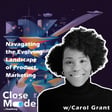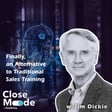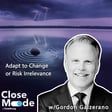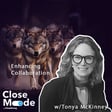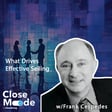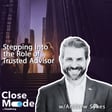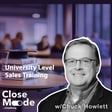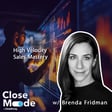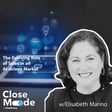Become a Creator today!Start creating today - Share your story with the world!
Start for free
00:00:00
00:00:01

The Future of Sales Methodologies & AI w/Andy Paul
In this episode, Brian Dietmeyer talks to Andy Paul about the effectiveness and relevance of sales methodologies in today's dynamic market environment. They explore the real impact of traditional sales methodologies versus adaptive frameworks that respond to actual buyer behavior and decision-making processes. This insightful discussion challenges conventional sales wisdom and provides practical advice for improving win rates and sales performance.
Timestamps:
- 00:17 - Introduction of Andy Paul and his background.
- 01:17 - Discussion on the role of sales methodologies in current sales environments.
- 03:25 - Andy challenges the necessity of rigid methodologies in sales success.
- 10:27 - Exploring the impact of sales methodologies on win rates and company performance.
- 17:12 - The shift from linear sales processes to more adaptive and responsive approaches.
- 25:33 - How technology, especially AI, is reshaping sales strategies.
- 34:18 - Andy emphasizes the importance of understanding buyer decision-making processes.
- 39:15 - Conclusion and reflections on the discussion's key points.
Transcript
Intro
Introduction to Brian and Andy
00:00:06
Brian
Hello and welcome to another edition of closed mode, the enterprise sale show. I'm Brian deep Meyer, CEO of close strong, the home of precision guided selling. And today I'm legit excited to be here with, with Andy Paul and Andy.
00:00:21
Brian
and A lot of you will know him. he He runs his own podcast. I think he's got about 50,000 subscribers. The author of Sell Without Selling Out, a new book coming out soon as I understand it.
00:00:31
Andy
Uh, in a year, I'm just, I'm just, well, yeah, it'll go by quickly.
00:00:31
Brian
Founder of the sales.
00:00:33
Brian
All right. That soon ish.
00:00:37
Andy
I'm just, I'm in the throws, the final revisions. Yes.
00:00:41
Brian
Cool. yeah Yeah. Having been there a couple of times, I appreciate what it what it takes to get that done. Andy, Andy also is, you know, it's funny, I was looking through your website and and I love your, your focus on, on, uh, win rates and the win rate consulting that you do. And we'll probably talk about some of that, but before any of that, welcome to the show.
00:01:01
Andy
Well, thank you. Thanks for having me, Brian.
00:01:03
Brian
I'm honored to interview the podcast of podcasters. I told you in an offline conversation that when I started mine, I went and looked at yours and I was like, what does this guy do that's so
Rethinking Sales Methodologies
00:01:15
Brian
dang good? And so I really am excited i really am excited to have you there. so
00:01:19
Andy
Thank you.
00:01:21
Brian
and you You and I were chatting a week or so ago and and you you were talking about the the role of methodology. Let's just go something super street level right away.
00:01:31
Brian
The role of methodology in the current environment.
00:01:32
Andy
Sure.
00:01:34
Brian
Yeah, tell tell me why you brought that up. What are your thoughts on that?
00:01:38
Andy
That's fine. I was just thinking about again today is, is I was reading a post, somebody had posted on LinkedIn about, yeah, you just can't have a chance of succeeding unless you have a methodology and in sales and.
00:01:50
Brian
Yep.
00:01:54
Andy
You know, I'm, I'm kind of ambivalent about that whole thing. Cause I don't think that's true.
00:01:58
Brian
Yeah.
00:01:59
Andy
I think that many companies have succeeded extremely well without having an embedded methodology.
00:02:01
Brian
Yep.
00:02:07
Andy
in fact, I was just, you know, talking to, uh, somebody had bought a you know company I'd worked for at one time. That's now I worked on very early days.
00:02:16
Andy
They're not a multi-billion dollar company, but and I took them from help them go, help them go from, you know, five mill to a hundred plus million. But. They don't have a sales function. They don't have a sales the VP. They don't have a sales of sales. They, you know, they, they sell differently. They sell on sort of a program basis. And, but the point being is that there's lots of different ways to do this. And this idea that, you know, you're be lost if you don't have the standardized methodology that's being propagated throughout the entire sales team.
00:02:48
Andy
It's just wrong. I mean, it's, and there's a couple of reasons. One is, is that, you know, if you look at average win rates across B2B selling, and let's just take the SaaS world, the data that came out in SaaS and software, so 18 to 20% average win rates across all AC, five different ACV segments from low to high.
00:03:03
Brian
ye
00:03:07
Andy
A book came out a few years ago said in B2B sales for deals greater than a hundred K, which pretty modest size deals average win rates 17% across 15 different industry segments.
00:03:20
Andy
And it's like, well, Hey, if the methodology is so good, why do we suck so badly at the close at winning deals? Right.
00:03:26
Brian
Yep.
00:03:27
Andy
And so that I think is, is really the issue is we think, Hey, the methodologies are the end all be all.
00:03:27
Brian
Hmm.
00:03:32
Andy
But the fact is you look at what's happening in. Trends in sales performance and methodologies aren't what's making the difference. And, and also there's disagreeing about what constitutes a methodology.
00:03:41
Brian
Yeah.
00:03:45
Andy
I mean, medic is not a methodology, medic is a framework, a med pick is a framework.
00:03:46
Brian
Yeah.
00:03:51
Andy
It's not a methodology. And I think there's a tremendous amount of value in frameworks. In fact, i think I think, intuitively, what my long, long the years of experience in this field are telling me is that we've gone through this era in the last 20 years or so where the emphasis has been on, yeah yeah, let's have a standardized way of selling. And the technology enables us to implement a standardized way of selling.
00:04:22
Andy
But when you look at the results, hey, there's no standardized way of making decisions on the part of the buyers, right?
00:04:28
Brian
Yeah.
00:04:29
Andy
And so when these methodologies hit the whole cold, hard reality of, of human behavior on the parts of the buyers, you know, they, they sort of fall apart.
00:04:29
Brian
Yeah.
Non-linear Buyer Decisions
00:04:38
Andy
And.
00:04:38
Brian
And I'm hearing this, I'm hearing this more and more lately, but like the the linear notion is just more and more so. Like I've heard this often. It's just, it's going out the door, you know, and, and yeah, linear process just doesn't work.
00:04:54
Andy
Well, and the buyer's not making a linear decision in a linear fashion and they're not doing it in stages the way that, you know, we lay out our sales.
00:04:57
Brian
Right, right.
00:05:01
Andy
So we've gone and you and I both know, I mean, I've been around longer than you have, but we both been around a long time is this whole notion of sales stages is relatively recent in the history of B2B selling.
00:05:15
Andy
I mean, they really became institutionalized once we started having the CRM as a tool to track what we were doing.
00:05:15
Brian
Yeah.
00:05:21
Andy
People saying, well, what's a logical way to track our progress? So let's create these stages, right? And yeah, my argument and my belief is that, okay, there's some value to understand what you're supposed to be doing when, but it should align with what the buyer is doing and what they need from us as sellers. And instead we flip that on its head and our stages are all about what we need to extract from the buyer.
00:05:49
Brian
Right.
00:05:49
Andy
And it's all about us instead of us helping them. And so yeah, I think we've gone through this phase and as you mentioned, as I mentioned as well, I think we're, we're going to come out of this a little bit differently. And yeah, I saw an interesting quote, you know, big soccer fan and read a lot about soccer, but there's been this similar sort of trend and management of soccer teams where it became very much about the process and the the, you know, much more rigid compliance to certain, you know, styles and and formations that they used and so on.
00:06:23
Brian
Yeah.
00:06:25
Andy
And there was this, yeah, article by this well-known soccer writer saying, yeah, you can see the trend from talking to managers was saying us, look, we need to be less about a rigid formation and more about providing our players a platform.
00:06:38
Brian
huh
00:06:38
Andy
on which they can extemporize, right? Meaning respond to what's happening in the moment.
00:06:43
Brian
Yeah.
00:06:43
Andy
And that's, I think one of the great things that's been missing, important things have been missing from selling, from sellers and broadness, more rigid compliance oriented era, is that when things go sideways, they don't know how to adapt.
00:06:43
Brian
ye
00:06:58
Brian
So I wonder, a conversation comes to mind. um Adam Kazart was until recently the the head of product and outreach and his firm was acquired by outreach, right? He built their forecasting tool. He made to me a really interesting point that he said ah ah all the tools and and maybe even methodologies were based on the ability to aggregate data because that's all we had, like from a technological perspective. And he said, but now,
00:07:24
Brian
and aggregating hard data and and linear steps and but he said now with the advent of a i. We can aggregate qualitative data. and reactions, and and it just struck me as just this this massive enabler to allow us to think differently about what you just said, right?
00:07:42
Brian
If we can now aggregate qualitative data and and look at trends of things that are always shifting, I just wonder how you how you if if you feel similar that tech is enabling us to rethink some of this.
00:07:47
Andy
Right.
AI's Role in Sales
00:07:56
Andy
Well, yes and no. Right. So, I think the challenge is for, for people as they're envisioning, how do we use AI most effectively in sales?
00:08:09
Andy
Is to change their mindset about what sort of the basic selling buying formula is. Right. And as long as we, as long as we saying, look, we're going to apply AI within the sort of this structured.
00:08:24
Andy
linear sequential model. That's really fundamental at us and our timeframes and what we need and make it less about the buyer, what the buyer needs from us in order to help them make decisions. Then we're just going to repeat the errors. I think we've made with sales technology and and which for all the virtues, some of the sales technologies have. I still believe fundamentally they haven't fulfilled their up their potential because just look at the results, right?
00:08:53
Andy
Just as people say, scoreboard, look at scoreboard, look at win rates, win rates are in the toilet, you know, quota attainments down, buyer dissatisfaction with sellers, perhaps has never been higher based on studies from Gartner and Forrester and others.
00:09:08
Andy
It's because we're stuck in this this mindset about what selling is, and it's not serving us, right? So we can put all the technology we want into it, but it's unless we change that
00:09:17
Brian
So you.
00:09:21
Andy
that mindset about what our job is as sellers, it's not gonna change the outcomes.
00:09:22
Brian
Yeah.
00:09:25
Brian
Well, that, that leads me to something you said to me last week about, uh, for 25 years, we've not been really selling or executing real selling. I feel like it's connected to what you were just saying.
00:09:37
Brian
So what, yeah, expound on that a little bit.
00:09:37
Andy
Yeah. Well, I mean, when you become more, more compliance oriented,
00:09:48
Andy
right, is then sellers act in a way to sort of optimize the performance to expectations about compliance. So instead of selling authentically where sales has become performative, right? and I know I'm being judged with a number of meetings I'm going to set. So I'm going to optimize the things I do to set meetings.
00:10:12
Andy
rather than optimize my learning and my skill development, everything to be able to help my buyer make decisions more effectively so I can win a higher fraction of my deals.
Improving Win Rates
00:10:23
Brian
Yep.
00:10:24
Andy
And, and so, you know, to some degree, we've gotten so distracted by elements of data that we've taken our eye off the ball.
00:10:37
Andy
And yeah, I, I'll make the claim here is that I think that, you know, if you're in a business where your average win rates are at 20%, let's say in software world, if your company has an average win rate of, you know, in the 20% range, I'll, I'll tell you right now, you're not serious about sales.
00:11:00
Andy
Full stop. If you're, if you accept win rates that low, you're just not serious about it.
00:11:06
Brian
Yeah. me Well, it's a chip.
00:11:08
Andy
No matter what you say, you're not serious about it. Yeah, you have people on, you have people on payroll that you're paying, you know, seller's base salary.
00:11:17
Brian
Yeah.
00:11:19
Andy
Why aren't you investing if they got a, you know, so individual, the 20% win rate? Why aren't you investing to make that 21%, 22, 25%? Why isn't that number one on your list as a manager about what to change?
00:11:30
Brian
yeah
00:11:32
Andy
Because there's certainly, if you're in a recurring revenue business, Hey, The impact of each 1% increase this year in your win rate on your recurring revenue and subsequent years is pretty substantial.
00:11:44
Brian
Yes. Yeah. i just I just had to see, I just had a CSO say that to me. If we can get two points on our renewals, like the the impact impact is massive. And you know, the bet, but back to the win rate thing, Jim Dickey was telling me a couple of weeks ago that in one of his studies that win rates moved about two points in 20 years, which is like what, what you just said, I know it'd be true when he gave me that. And then you think about the billions that have been thrown out.
00:12:11
Brian
investments and two, two points of movement in 20 years. He also said that top of the funnel has been the number one investment for 10 years in companies. So there's a bunch of stuff that's not working.
00:12:19
Andy
Oh, yeah. Oh, yeah. Not working at all. Right. I mean, it's, it's, this is what I was talking about before, how the mindset has to change.
00:12:28
Brian
Yeah.
00:12:28
Andy
Right. It's is, yeah, I have several conversations and yeah reading stuff on LinkedIn with people about, you know, pulling the hair out is like, oh, top of funnel is so hard.
00:12:40
Andy
And I'm like, well, no. I mean, yes and no. I mean, the fact is, first question to somebody is when you're saying top of funnel is so hard, is what's your win rate?
00:12:49
Brian
Yeah.
00:12:49
Andy
Well, it's 20%. I said, well, you've got more than enough prospects. The opportunities isn't your issue, right?
00:12:56
Brian
Yes.
00:12:58
Andy
You're, yes, it's an issue. If you consider continue going along to this rock bottom win rates, but if, if you learn how to actually sell your products, right? So for me, when I joined a startup as a sales leader, what I wanted to do is say, look, how do I double and triple sales without adding headcount?
00:13:19
Andy
And it's not that hard because what you you find is that people, when a company is struggling and they've got low in rates, this fundamentally don't know how to sell the product.
00:13:21
Brian
Yeah.
00:13:29
Andy
And unless you have something that's, you know, completely subpar and substandard, I mean, There's a way that your customers will tell you how to sell it, right? Tell you how to help them make decisions, how to win the order. You just have to go in and pay attention and make it an area of focus. And it's just not today. And this is, this is why we continue to bumble along with these, you know, top, top heavy funnels that aren't generating the business people want out of them.
00:13:59
Brian
Yeah, it's, Andy, it's it's such a theme that I'm hearing, you know, where that it regardless of what the number is, I mean, I'm hearing now the average funnel was 2x, it used to be 6x. And so this becomes even more important, right? That especially than top of the funnel, converting more of what's in there. But you you made the point to me that,
00:14:18
Brian
Sort of what worked in a growth market doesn't work now. What, what do you think works now? Like what, what drives this? So the lagging indicators went right, but what are the leading indicators? What do you see as the shifts we need to make?
Creative Sales Strategies
00:14:30
Andy
Well, yeah, I mean, but yeah. I also think win rates a leading indicator too, but, because if you don't change your behavior, your win rates dictating what your future performance is going to be.
00:14:40
Andy
So, and that's, people always talk about it lagging, but, but in terms of what people should be doing is, is you gotta be creative, right?
00:14:42
Brian
Yeah.
00:14:52
Brian
Yeah.
00:14:53
Andy
yeah You have to.
00:14:55
Andy
Yeah, there's this, there's a general sense that you, that you're getting and not, yeah, it's primarily in the SAS role, but not entirely, but is that, yeah, you had, you depend on inbound and it's like, well, okay, you can't depend on inbound and people say, well, let's do outbound. But for them, outbound is let's just bombard people with emails and and social touches. And so it's like, no, do something different, go to conferences, go knock on doors again, you know,
00:15:25
Andy
People are back in the office, the decision makers at the land large are back in the office, right? Get on a plane and go so do something different. You know, it's, there's, it's like, it may be a little more expensive up front, but if you're selling a product, that's yeah a six figure product, get on a plane, go knock on some doors, right? It's, it's.
00:15:47
Andy
ah ah Try something different because what's happening now isn't isn't working. And, you know, you get the this feeling from, you know, sellers, it's like, yeah, we've just, we've polluted the channel so badly.
00:15:51
Brian
Yeah. Yeah.
00:16:00
Andy
We can't get anybody to respond.
00:16:02
Brian
Yeah, yeah.
00:16:02
Andy
And my response to that is, well, hey, when I was at your stage of my career, no one responded to my emails either.
00:16:04
Brian
a
00:16:11
Andy
Of course we didn't have email, so it was guaranteed no one was going to respond to them. And we couldn't, no one answered our phone calls because every call, and you appreciate this, every call we made went to a switchboard, to a receptionist, to an admin.
00:16:25
Brian
Yep.
00:16:26
Andy
We had three, go through three levels of people just to get to the person who wanted to speak to, and we almost never got through.
00:16:26
Brian
Yep.
00:16:32
Brian
And then, by the way, that that person, you got the pink slips on your desk, right? From the missed call.
00:16:37
Andy
yeah That's right.
00:16:38
Brian
And whoever whoever's young enough to not know that pink slip, but I remember as a VP at a Fortune 50, coming in and seeing the pink slips and going, oh man, I got to return all these.
00:16:49
Andy
Yeah.
00:16:49
Brian
You just you just brought me back.
00:16:51
Andy
Well, and we, sorry so we never, we never got through, right?
00:16:52
Brian
you know
00:16:54
Andy
I mean, it was rare that we got through it.
00:16:55
Brian
Right.
00:16:56
Andy
We didn't get through any more frequently than people today get through making on phone calls. So what did we do?
00:17:01
Brian
Yeah.
00:17:03
Andy
Well, I mean, I'm looking at my case. It's like, yeah, i yeah. I doubled down on. I was selling in a local geographic area, but I mean, I doubled down on going to, you know, business meetings, right?
00:17:15
Andy
The rotary Qanas, you know, whatever those things existed in those days, but now they're different ones today.
00:17:18
Brian
Yeah.
00:17:19
Andy
Uh, you know, chamber meetings, you know, special interest groups, I'd go sit on cars and parking lots, right? You don't do that. Wait in some of the parking lot for somebody to business owner to leave their company on a Friday night guaranteed way to get them.
00:17:28
Brian
Yeah.
00:17:32
Andy
You did something, you got creative and you broke the mold.
00:17:33
Brian
yeah
00:17:36
Andy
You took risks. and find something that worked for you. I mean, for me, one of my effective strategies, I was selling it to the, excuse me, and first Java school, selling it to the construction industry, selling, you know, reasonably good sized computer systems on-prem to contractors, is I would hold a seminar every week in our branch office, Wednesdays at 4 p.m. And I would, each week I would send out
00:18:09
Andy
you know, 10, 15 postcards to CEOs or GMs of construction companies saying, I've got a seminar on job cost accounting in our branch office. And then I would just follow up like mad, right?
00:18:22
Andy
Cause I knew if I could get three to come in a week, I was going to get one good opportunity out of that.
00:18:30
Brian
Well, but Andy, there's there's a— Yeah.
00:18:31
Andy
No one else, is no one else was doing that, but that's why I was doing it. And you can do something similar today. You just have to think outside the box.
00:18:36
Brian
Yeah. Yeah. No, and and it's to to a degree, it's it's going going back to some kind of old school style of stuff. one One of the proudest parts in my career was many, many, many years ago, I was a national account guy selling in Detroit, and I was selling to the big three auto companies.
00:18:56
Andy
Right.
00:18:56
Brian
and And I'm thinking through like a lot of things I used to do to get in front of these people, because our company had never had a rep call on Detroit. And it was very different. And I remember even changing cars every two days, because like if I was calling on Ford, I'd make sure I rented a Ford and then GM.
00:19:11
Andy
Yeah. Dropping a Ford. Absolutely. yeah That's right.
00:19:13
Brian
And I remember all all this hassle of changing. But even that level of detail about just in case, if they see me pull up, and I will tell you, HR departments would go nuts on this.
00:19:23
Brian
but with With the big three auto companies, you know Detroit is right on the on the river with Windsor, Ontario on the other side.
00:19:29
Andy
Right, right.
00:19:29
Brian
and There's a certain a certain sort of dance venue that's prevalent on the other side of Detroit in Windsor.
00:19:37
Andy
Yeah.
00:19:37
Brian
and and and I used to go to these dance venues with these you know execs from from from the big three. I won't even say the company names. and and and get hit with huge bills.
00:19:48
Brian
that and I remember coming back, I worked for Marriott Hotels, a pretty pretty like buttoned up company. I had to go back to my controller.
00:19:54
Andy
Yeah, yeah, yeah.
00:19:56
Brian
and and i i well I actually said to one of the execs, out they sent send me the bill and I was like, oh my God, I'm never going to get this through my company. you know This is like a $2,000 bill. and He said, They all started laughing.
00:20:07
Brian
The one guy said, oh, the Windsor Ballet. And I said, what? And he said, it goes out in your expense report is the Windsor Ballet.
00:20:10
Andy
It's kind of Windsor, Bella. Yeah, right.
00:20:12
Brian
yeah text so but yeah Sorry for that, that old school, like frontline selling story, but this is your whole line of creativity. Just really, it hit me. I'm even thinking about my own selling.
00:20:23
Brian
Like I re I really like that. It's like, am I doing enough to think about what we used to have to do when people wouldn't return our calls?
00:20:32
Andy
Yeah. And it's, it's not old school. It's what works.
00:20:37
Brian
Yeah.
00:20:38
Andy
And that's this, are this is,
00:20:38
Brian
Yes.
00:20:40
Andy
This is a thing that's yeah hard for, yeah, I think some sellers get their minds around. In fact, it's not old school, new school, modern.
00:20:46
Brian
Yeah.
00:20:46
Andy
it's It's what works, right?
00:20:48
Brian
Yeah.
00:20:49
Andy
We're talking to, you know, people say, oh, people, they buy so differently today.
00:20:49
Brian
Yeah.
00:20:53
Andy
It's like, well, sure, the mechanics of the way we buy is different. But we're human beings that haven't substantially evolved, evolved, you know, very slowly over the last 30,000 years.
00:21:02
Brian
Yeah. Yeah.
Helping vs. Selling
00:21:05
Andy
The way we make decisions, still pretty much the same. So how do we, how do we insert ourselves into there and help them make these decisions?
00:21:10
Brian
Yeah.
00:21:15
Andy
Well, that's, you know, yeah, there might be some things that people are doing 20 years ago that are hugely effective. We'll do it again.
00:21:23
Brian
Yeah. Yeah. But I do, i I do think, yeah, one of those areas of creativity is helping them make decisions. We know the data is all out there that, you know, there's committee buys now and decisions are delayed and no decisions on the rise. And I think you you hit on a hot button of mine, which is,
00:21:39
Brian
I think that's a key skill for sellers in today's market if they want to buy or to talk to them. And it's not necessarily how to buy my stuff. It's it's how to source this category. Let me help you work through this this complex buying process because you're only doing this once in a while.
00:21:54
Brian
I'm an expert at this.
00:21:55
Andy
Yeah, but I think there's right, but I think when there's people have to understand that buying is not the same as making a decision.
00:21:55
Brian
I watch people buy this all day long.
00:22:08
Andy
So there's things that buyers do to buy some of the mechanics you talked about that are important and sometimes they need help with that.
00:22:16
Brian
Yeah.
00:22:17
Andy
But before they get to that stage, they have to make a decision. They have to make two decisions, right? They have to make the decision to make a change and they have to make the decision who they're going to change with. And then some of the mechanics of the buying sort of happen in parallel or sometimes after that, right? I mean, going through procurement, that's a mechanics of buying, right? It's, but the decision is being made by a different group of people behind large, not by procurement, which is negotiating. So.
00:22:42
Brian
Yeah.
00:22:44
Andy
Yes. It's the same thing true on, on the sale side is, is there are things we do that are necessary as sellers, but the buyer doesn't need our selling.
00:22:54
Andy
They need our help.
00:22:56
Brian
just
00:22:57
Andy
And so helping and selling are not the same thing. They're two distinct emotions and we do both.
00:23:00
Brian
Right. But so yeah, so something, something you just said that we haven't talked about that I so unbelievably fundamentally agree with is reframing to decision-making. And, and you know, I, I taught decision-making in the past and, and so it's helpful.
00:23:16
Brian
for me, that is what they're doing. And there are some fundamental decision-making sort of tenants or frameworks or that kind of thing that I believe reps should be taught, right?
00:23:19
Andy
no
00:23:28
Brian
And I remember be back in the day, bringing decision-making to Shearing Cloud.
00:23:28
Andy
Yeah.
00:23:32
Brian
And one of the execs came up after and was like, and nobody goes to a decision-making class. And they he came up after and said, I'm not sure what this is, but I know we need a lot more of that. you know so it's I couldn't agree with you more.
00:23:43
Andy
Well, but we're but yeah we're we're put throwing sellers into the mix, yeah into this competitive environment without really understanding what the buyers are trying to do.
00:23:57
Brian
Yeah.
00:23:57
Andy
and And the elements of what they need to go through to be able to make a decision. And it's as an entity that's comprised of people, they make decisions the same way humans make decisions.
00:24:03
Brian
Yeah.
00:24:13
Andy
And yeah, the way humans make decision is, well, first I have to define what my problem is, right?
00:24:13
Brian
Yeah.
00:24:19
Andy
And then define what the outcomes I want to achieve are. And then when I've decided to find those, i I want to, yeah, I'm choose how I want to achieve those outcomes.
00:24:33
Andy
And then the third order decision is, well, who do I want to work with to achieve those outcomes?
00:24:39
Brian
yeah
00:24:39
Andy
So I.
00:24:39
Brian
and what what else i'm sorry what What I'll tell you from from having run tons of scenarios where I would put people into decision-making environments, people are fundamentally bad at this.
00:24:50
Brian
and and what they What they often do is either the right people aren't involved or
00:24:51
Andy
yeah
00:24:55
Brian
or they have criteria for their decision that's completely overblown. Like this thing is very present in my mind, but it's not the most important thing. And then they leave out other criteria. Most of us that are selling have won maybe sometimes for the wrong reason, you know, or or we've lost.
00:25:11
Andy
Sure.
00:25:12
Brian
We've even lost for those the wrong. Well, we know we're like, oh, this this is actually a much better solution than what they bought. But humans are fundamentally bad at this. So this is why I say it's it's a huge
00:25:23
Andy
They, well, they need our help.
00:25:25
Andy
That's what I'm saying is, is you see the data that says 75% of buyers don't want to talk to salespeople.
00:25:25
Brian
Yeah. Yeah.
00:25:34
Brian
Yeah.
00:25:35
Andy
And again, I, as I like to say, well, that number is completely wrong because it's actually a hundred percent of buyers don't want to talk to salespeople. But if your salespeople was talking to a salesperson, was talking to a buyer, it's not because they want to, it's because they need to, right?
00:25:52
Brian
yeah
00:25:52
Andy
They're not talking to you. If they could do their job without talking to you, they would, right?
00:25:56
Brian
Yeah.
00:25:56
Andy
there so They need help in some dimension. So what is that help they need? Well, I mean, again, if you understand how humans make decisions, you can sort of place it pretty quickly in the framework of what, oh, well, this is what they need from me. And what they need is they need your help to make progress toward making a decision.
00:26:14
Brian
And what what's what's just interesting about that, as I was speaking with a sales enablement professional, and and she focused a lot on the soft skills, a lot on empathy, and what she said about that issue.
00:26:25
Brian
When you start helping someone, I would say they lean in, and what what she said is like technically, they allow themselves to be more vulnerable, which allows them to share more data.
00:26:35
Brian
Like the more you're leaning in and helping, the the more they kind of open up.
00:26:36
Andy
yeah
00:26:39
Brian
and And it struck me when she said that, you know, that I think that is what happens.
00:26:44
Andy
Yeah. So, I mean, it and this is, again, this is, this is a mindset thing for sellers to understand is, and on an individual level is, is, yeah, I believe that, that buyers basically hire us to help them.
Job to be Done Theory
00:26:59
Andy
I'm a big believer in the jobs to be done theory. And, you know, jobs to be done theory was so Clayton Christensen talked about this is that when people buy a product.
00:27:08
Andy
I'm not buying the product, what they're buying is the progress the product enables them to achieve in some dimension in their life.
00:27:12
Brian
Yeah.
00:27:15
Brian
Yeah.
00:27:15
Andy
Right? So we're hiring the product enables to make progress. So I think by the same, the same token is your buyers, quote unquote hire you to help them make progress in making a decision.
00:27:27
Brian
Yeah. So to to that, to that point, I'm sorry.
00:27:29
Andy
Yeah.
00:27:32
Andy
Yeah.
00:27:32
Brian
That's like, you keep making me think of stuff, but i'm I'm wondering how you feel about the the notion of, of diagnostics. Like I feel like we're there's, we we diagnose a problem and then we prescribe a solution.
00:27:43
Brian
And so many of us are coming in and prescribing the solution. And I'm wondering how you feel about sales teams capability and the way they're being skilled up to do proper diagnostics.
00:27:46
Andy
Hmm.
00:27:53
Brian
Because if I'm a buyer and a seller says to me, I'm not going to try to sell you my widget yet. Let let me get under. What are you, what are, you you know, doing, doing that true diagnostic work. Do you think that's important?
00:28:04
Brian
Do you think people are good at it today?
00:28:08
Andy
Yeah, I, I tend not to look at it as a diagnosis, right?
00:28:13
Brian
Okay.
00:28:13
Andy
Is I look at it as a definition, right? So I want to help the buyer define the problem. And yeah, that's, that's our first step, right?
00:28:25
Brian
Yeah.
00:28:26
Andy
How are we going to work together to the scope out the challenges they have and then to also define
00:28:26
Brian
I, I, yeah.
00:28:34
Andy
based on that, the outcomes they want to achieve, right? So I want to be able to show them what the opportunities are and help them think about that.
00:28:37
Brian
Yeah.
00:28:41
Andy
And perhaps in ways that hadn't thought about it before, the opportunities and the outcomes potentially that could be derived from, from that. And what I'm trying to get to when I do that is, is my experience has been in my long career and selling seven, eight, nine figure deals is that in every instance,
00:29:03
Andy
Every opportunity I've worked on, there's always one thing that was more important than any of the others. One thing the buyer wanted to achieve.
00:29:14
Brian
Yeah, yes.
00:29:15
Andy
And our job is to find out what that one thing is.
00:29:18
Brian
Yep. Yep.
00:29:19
Andy
And then, cause that's the thing that's truly most important. And my last book, Self Outselling Out, I call it their most important thing, right? We want to find out what their most important thing is. It doesn't mean there aren't other things, but I mean, just given examples is, years and years ago, I was working in the satellite communications business and we had the opportunity to sell really as good. The first of its kind, it was a system to provide internet browsing,
00:29:47
Andy
real-time in state rooms on cruise ships. And so this was still back in the 90s, so it was it was pretty new at that point. And so we were working at this big cruise line and this Asian-based cruise line, and they at some point had engaged some outside consultants as they do, and they'd come up with this big RFP document they submitted to us and we had been down selected. We were a very small company. We had, we were down selected to, uh, uh, the final two and we were going to get this RFP. And so my sales guy been Asia came back and we were looking at this ah RFP and they had a compliance matrix for the, those are familiar with compliance matrix. So basically the customers, you know, list of things they want, right? And you have to tell us, do you do it or not doing, if you don't do it, what do you do instead? Blah, blah, blah.
00:30:40
Andy
You know, 300 items ran multiple pages. And I'd looked at the sales guy said, look, they're not all equally important.
00:30:49
Brian
Yeah.
00:30:50
Andy
So what's the one that's really driving the decision? What's their one thing? So he got back on a plane, went back to Asia and met with the CEO.
00:31:00
Andy
And we found out that, yeah, they wanted high speed internet browsing in the state rooms or voice over IP, blah, blah, blah, blah. He came back and he said, well, more actually called and I said, so this is what they want.
00:31:12
Andy
He said, the only thing the CEO really cares about is having and a satellite link that never goes down between headquarters and the onboard casinos.
00:31:22
Andy
Cause he wants to be able to know up to the minute how much money they're taking in on the casinos. Now that one wasn't even in the RFP anywhere.
00:31:31
Brian
Yeah, yeah. Yep.
00:31:33
Andy
Right? And so we basically ignored the compliance table and focused our bid on how do we configure the system such that with hot standbys and and dual links and so on, that that link was never going to go down on a cruise ship. That he was never going to be, not know up to the minute what the take was from the Osborne casinos.
00:31:52
Andy
And we won the deal. It was a huge deal for us at that time, but that was because it was their one thing.
00:31:54
Brian
yeah
00:31:58
Andy
And I can go back and give you, spend two hours giving you stories about customers worked with was the one thing.
00:31:59
Brian
yeah
00:32:04
Andy
And when you really understand it.
00:32:05
Brian
i Yep, I could do the same. And I wish at some point maybe I'll find something to disagree with you on, but that also, like we we think of those, <unk> it's it's not it's not only that that most important thing, it's also the most important player.
00:32:19
Brian
And a lot of people talk about decision makers and we tend to think in terms of thought leaders, like who is the person in the room that other people look to and go, well, shit, if if Andy feels it, then boom, like my idea is gone.
00:32:20
Andy
Yes.
00:32:26
Andy
Right.
00:32:31
Andy
Yes.
00:32:32
Brian
And so it's that, it's like, who who is that? We think about who is that key player Uh, and, and it could be a thought leader. It might not even be the decision because a lot of times the decision makers are looking to the thought leader.
00:32:39
Andy
her
00:32:42
Brian
And what does that thought leader care about? It's, it's, it's actually the simplicity. That you're, you're exactly right. That's what wins. And there might be a couple of things you went on with a couple of different players, but I agree.
00:32:53
Brian
And so I, yeah,
00:32:54
Andy
Yeah. And you, but yeah, I'm glad you brought that up because that really is the second part of the equation is what's the most important thing and who is it most important to.
00:33:02
Brian
correct.
00:33:02
Andy
And to your point, it's not necessarily a, you know, align the guy at the top of the chain.
00:33:03
Brian
Yep.
00:33:07
Andy
It could be who's the, who's the bully with the pulpit basically.
00:33:13
Brian
Yeah. Yeah. That's why we we tend to think in terms of thought leader because there there is, there is a person in the room.
00:33:14
Andy
And.
00:33:16
Andy
Exactly.
00:33:19
Brian
And it's funny too, because we were talking the other day about how to, how to qualify and find that person. And and someone outside of my organization said, it is the person that other people turn and look to. Like if you if you're in a meeting or on a Zoom call, you can see that they're, they're giving that reference.
00:33:29
Andy
Hmm.
00:33:34
Brian
So we are reverent. So we. Uh, we, we just stumbled on complexity and this is the the last thing I wanted to talk to you about. I
Internal Selling for Simplification
00:33:41
Brian
want to switch this a little bit. so I've talked to a lot of, a lot of CROs, CSOs, uh, uh, revenue enablement folks.
00:33:43
Andy
Sure.
00:33:49
Brian
And, and lately I've, I've spoken to five frontline sellers, five AEs. with with with varying varying levels of sophistication and i wanted to build a channel that i call the voice of the rap and it's like alright for all you see level folks i've talked to. Go listen to these five reps right and listen to what they have to say and here is the the constant across all five they said you're killing me the complexity is killing me.
00:34:17
Brian
getting deals done, getting solution configurations approved, getting deals approved. You know, it's everything is so complex now. And, and it ties into that. Buyers buy in a relatively simple way, as you as you just pointed out. But yeah, rep reps are screaming about this to me right now. Say my companies are killing me.
00:34:37
Andy
Yeah, I'm not sure that's, that's new necessarily. and yeah.
00:34:41
Brian
Right. Good point.
00:34:44
Andy
Yeah. I mean, cause again, I just look at my experience on these immensely more complex yeah satellite communication systems compared to, you know, SAS systems people are selling today.
00:34:55
Andy
They have some complexity to it. Couldn't even begin to compare, right?
00:34:59
Brian
Yeah.
00:35:01
Andy
And my solution was, and actually I just had this conversation with a seller earlier this week, a client, was that, you know, selling happens internally and externally.
00:35:13
Andy
And if you look at your role as a seller externally, there's a leadership component to it, right? Because you, you are leading the buyer, the buyer is looking to you and to inspire them to take action at some level, right?
00:35:26
Brian
Yeah.
00:35:27
Andy
Through your actions, you're doing that. And. The same thing is true internally, is you need to enroll people in the things you're working on internally.
00:35:38
Andy
And every company is going to have bureaucracy and complexity. And the only way you try to simplify this, and it's and this is not not being a team player, but it's you do have to look out for your own interests, is that you need to sell internally.
00:35:52
Andy
You need to have people excited about the things you're working on.
00:35:54
Brian
Yeah, yeah.
00:35:56
Andy
and And to the extent you create this vision of of success for your buyers about what success is going to look like using your product, you have that sort of the counterpart vision with your colleagues internally. Well, this is if we succeed and get this deal and and roll this out, this is what it's going to mean for us.
00:36:14
Brian
Yes.
00:36:14
Andy
And, and so your, your focus is in both places, you know, as much as you're focusing externally, you have to devote time internally to get people enrolled and excited, just like buyers in your projects.
00:36:30
Brian
But it's it's sound it sounds like that can cut through some of the complexity, right?
00:36:30
Andy
And.
00:36:34
Brian
If you're telling your story properly internally, that might relieve some of the complexity and get get your deals done better.
00:36:38
Andy
Sure.
00:36:39
Brian
Yeah, I agree.
00:36:40
Andy
Yeah, I mean, and currently the amount of time you have to spend on ongoing basis, because yeah.
00:36:41
Brian
Yeah.
00:36:47
Andy
Yeah. If you're working a good sized organization, they got a lot of sellers and there's a certain focal point, let's say for engineering support or whatever. Yeah. They've got a lot of people contending for their time.
00:36:59
Andy
And again, we want people to be good team players.
00:36:59
Brian
Yeah.
00:37:03
Andy
But the fact is you're trying to get your deal done as a seller. I want to have that person give me priority on their time when I come in. Now the several ways I do that one is, yeah, I live up to my ah ah commitments.
00:37:16
Andy
i I close my deals, you know, I'm doing good business, but also I have to have to sell them and get them enrolled in the, I said, in the, in the project.
00:37:23
Brian
yeah
00:37:25
Andy
And if you do that, then, Hey, you might get a little bit faster response from them when they're getting busy. It sounds a little cutthroat to some degree, but the fact is you got to look out for yourself in this this environment.
00:37:33
Brian
Yep.
00:37:37
Andy
Cause you know, if you're not doing it, somebody else's. And if you're working on the type of deals that are really driving the company forward, they're strategic for the company, then you might want to say, Oh, well, sure.
00:37:49
Andy
The CEO will make sure they give me the time. Doesn't work that way. Right. I mean, ah ah we've all seen passive resistance work, uh, parts of employees that make their own decisions about how they want to spend their time.
00:38:00
Andy
So that was for me, was always a big one. And yeah, I love to tell the story because and this is an absolutely true story. once and I was in a meeting, I was VP at this company and smaller company, but we were doing some really large deals and CEO knocks on door and says,
00:38:18
Andy
He said, I didn't realize you were CEO of the company. I said, whoa, what are you talking about? I'm not CEO. oh You're the CEO. He goes, yeah, but I just did my daily walk around and asked people what they're doing. And they all said they're working on a project for you.
00:38:32
Andy
And I said, perfect.
00:38:33
Brian
Yeah.
00:38:34
Andy
That's just what way we want.
00:38:35
Brian
and Yeah. It's, it's, it's such a valid point. So I'm thinking back to my experience as a fortune 50 sales VP. And yeah, there were certain people who could get things done more quickly and they have more credibility internally. Like that's what came to mind when you were saying that. And I think it's, it's such a valid point.
00:38:53
Brian
Yeah, I have like a hundred more questions for you, but as as you and I both know, we don't want our podcast to go too long, but I literally have so many more things I want to talk to you about.
00:39:01
Andy
I'll do it again.
00:39:03
Brian
this is Yeah, we'll do it again. this I truly, honestly enjoyed it. I was looking forward to this and yeah.
00:39:07
Andy
Likewise.
00:39:09
Brian
So yeah, you've been super generous with your time and your ideas and thank you so much.
00:39:14
Andy
Oh, Brian, it's been fun. I literally look forward to doing again. And yeah, your episode on my podcast will be coming out shortly too.
00:39:20
Brian
Excellent, thank you.
